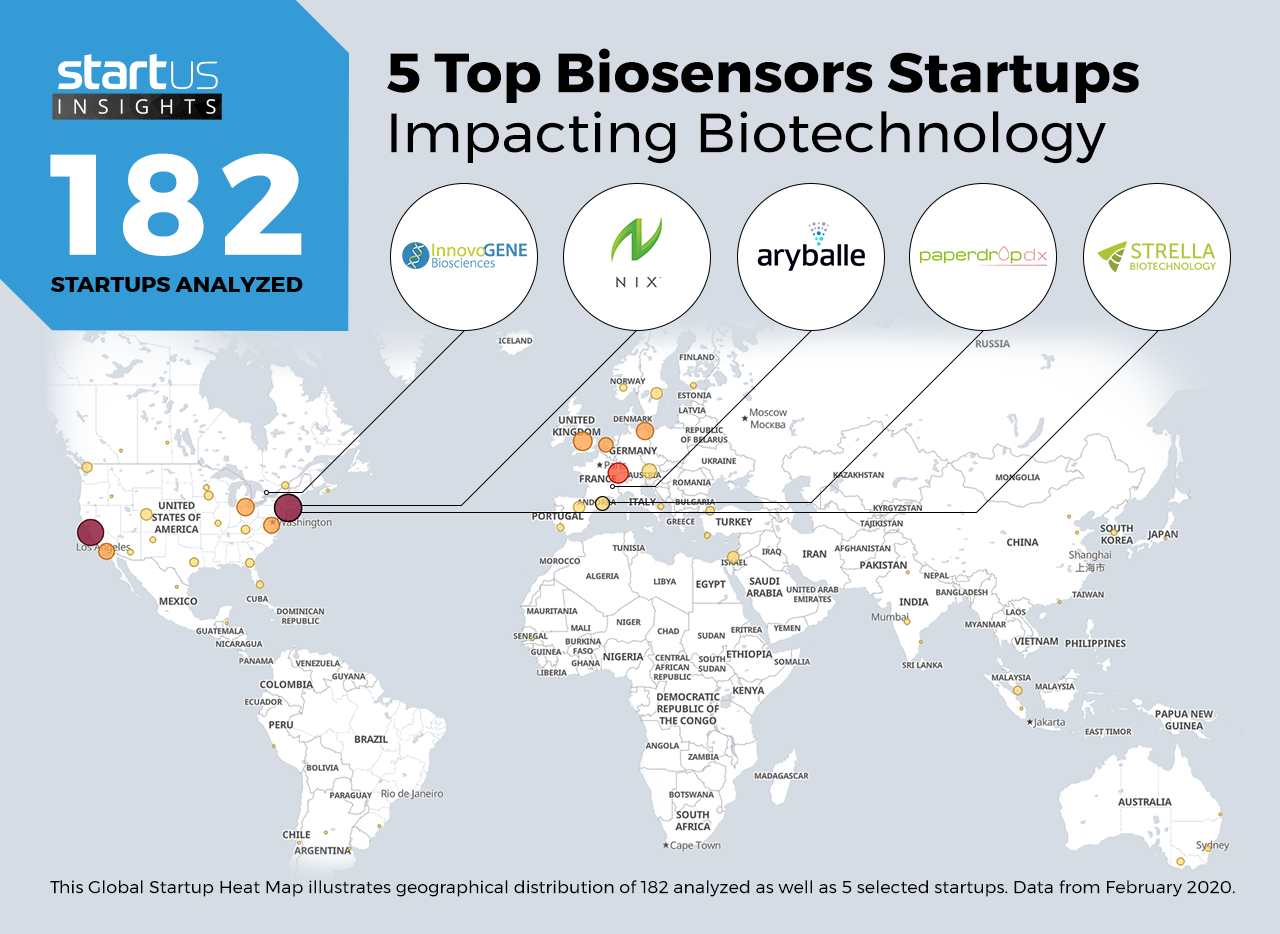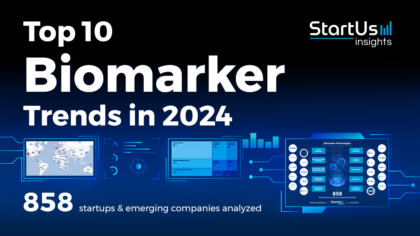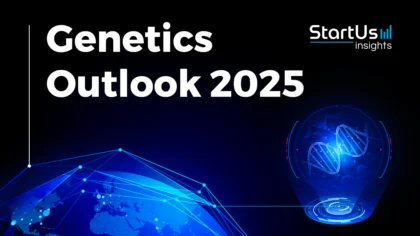Our Innovation Analysts recently looked into emerging technologies and up-and-coming startups working on solutions for the BioTech sector. As there are a lot of such startups working on various different applications, we want to share our insights with you. Here, we take a look at 5 promising biosensors startups.
Heat Map: 5 Top Biosensors Startups
Using our StartUs Insights Platform, covering 1.116.000+ startups & emerging companies, we looked at innovation in the field of biosensors. For this research, we identified 182 relevant solutions and picked 5 to showcase below. These companies were chosen based on a data-driven startup scouting approach, taking into account factors such as location, founding year, and technology among others. Depending on your specific criteria, the top picks might look entirely different.
The Global Startup Heat Map below highlights 5 startups & emerging companies developing biosensor solutions. Moreover, the Heat Map reveals regions that observe a high startup activity and illustrates the geographic distribution of all 182 companies we analyzed for this specific topic.
InnovoGENE Biosciences – Aptamers
Traditionally, most medical diagnostic biosensors have been antibody-based. However, antibodies are very expensive to produce and do not bind with the analyte as well as enzymes do. With advancements in nucleic acid synthesis, aptamers that bind and recognize pathogens or small molecules are now viable alternatives for antibodies.
The Canadian startup InnovoGENE Biosciences develops aptamer-based biosensors for diagnosis. Using a combination of experimental data and bioinformatics, they develop molecular biosensors that recognize a wide range of pathogenic bacteria. Their proprietary solution, Urasensor, is an affordable sensor that screens for pathogens and changes color on identification.
Nix Biosensors – Single-Use Sensors
Athletes know they need to hydrate themselves, but find it challenging to keep track of how often and how much liquid they need to consume. This leads to less than optimal performance. Similarly, there are other cases where simple lifestyle or nutritional changes help greatly but knowing when to make those changes is a challenge. Inexpensive, single-use wearable biosensors address this challenge.
Nix Biosensors, a startup based in the US, employs material science and bio-inspired engineering to develop a single-use, sweat-based biosensor. The sensor monitors the hydration levels for people who do a lot of physical work, athletes and workers for instance. It is lightweight and does not require any device to operate. Their technology also detects subtle changes in biomarkers in other body fluids such as tears, blood, urine, and breast milk.
Aryballe – Digital Olfaction
Odors are an easy way to characterize the quality standards during the development of food and beverages or cosmetics. While humans can detect a trillion different odors, they aren’t good at distinguishing between them. However, biosensors that mimic olfaction precisely detect and recognize a large number of odors. Manufacturers use these to profile odors and monitor quality during production.
Aryballe, a French startup, develops biosensors that analyze odor data. Combined with advanced optics and machine learning, their technology captures odor signatures and identifies and differentiates between odors. For the cosmetics industry, they provide solutions that assess the smell stability throughout production stages and ensure that odor defects from the packaging are not passed on to products.
Paperdrop Dx – Paper-Based Diagnostics
Diagnostic kits are expensive, need refrigerated transport, and have a poor shelf life. This is a major challenge for their adoption, particularly in developing countries. Even otherwise, repeated visits are an insurmountable task for people who need regular diagnostic tests. Paper-based biosensors circumvent these challenges and make diagnostics more widely accessible.
The Spanish startup Paperdrop Dx develops paper-based biosensors for rapid diagnosis of critical diseases. Their technology uses lateral flow immunoassays, like pregnancy detection kits, and paper microfluidics for inexpensive and user-friendly diagnostic tools. Their patented biosensor, Faststroke, predicts susceptibility for an ischemic stroke from a single drop of blood.
Strella Biotechnology – Food Biosensor
Food wastage along the supply chain from the farm to the customers is a major hurdle to food security. Specifically for fruits, customers do not prefer over-ripe fruits. Fruit biosensors detect fruit maturity levels and help make decisions about which fruits to move earlier to cut losses.
Strella Biotechnology is a US-based startup that develops biosensors to detect ethylene produced by ripening fruits. Their biosensors provide packers real-time maturity data on fruits. This allows maintaining produce at optimal freshness for the desired shelf life. They also scale this technology to individual pallets for retail applications.
What About The Other 177 Solutions?
While we believe data is key to creating insights it can be easy to be overwhelmed by it. Our ambition is to create a comprehensive overview and provide actionable innovation intelligence so you can achieve your goals faster. The 5 biosensor startups showcased above are promising examples out of 182 we analyzed for this article. To identify the most relevant solutions based on your specific criteria, get in touch.









